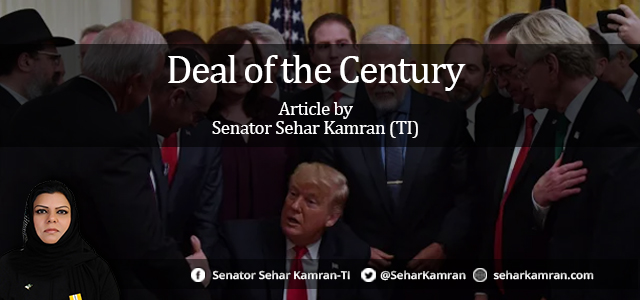Senator Sehar Kamran
Feb 08, 2020
 You can’t have occupation and human rights.”? Christopher Hitchens
You can’t have occupation and human rights.”? Christopher Hitchens
Last week, the US President Trump unveiled a 181-page Middle East peace plan. This much hyped and long-awaited plan was termed as the “deal of the century” by the American President. It has been crafted by Jared Kushner, Trump’s inexperienced son-in-law who is also currently serving as the senior White House advisor, along with Jason Greenblatt former lawyer in the Trump Organisation, and David Friedman, the US Ambassador to Israel famous for his pro-settlement stance.
It didn’t come as a surprise when this much touted but one-sided peace plan which has been in the making since President Trump took office was declared dead on its arrival by the Palestinian authorities. The credibility of this plan was evident from the fact that Palestinians were kept out of the negotiations and deliberations, and only the Israeli leadership was facilitated. US President hosted both the Israeli Prime Minister Benjamin Netanyahu and his political opponent Benny Gantz at the White House, for discussions. Despite being the most important stakeholder to the conflict, the Palestinian leadership was not consulted, thereby leaving a big question mark on the credibility and viability of this proposal.
The plan as envisioned by President Trump retains the concept of the two-state solution previously pitched by the American administrations. According to an image of the concept map, tweetedby the American President on the social blogging website Twitter, showed an even shrunk version of the state of Palestine than that proposed in the 1993 Oslo peace agreement.
It proposes making Jerusalem the capital of undivided Israel, whereas Palestinians would be allowed a form of sub-capital on the outskirts of the city, handing over control of over some 30 percent of the West Bank including the Jordan Valley to Israel.
The most contentious points of the plansuggeststhat on the West Bank, Israel would stop building new settlements for four years if Palestinian authorities recognize Israeli sovereignty over the existing settlements, which have been deemed illegal under the international law. During this timeframe, a Palestinian statehood will be ‘negotiated’. It should be noted that since Israel’s occupation of the West Bank and East Jerusalem in 1967, approximately 140 settlements have been built in which more than 600,000 Jews reside.
In addition, this plan which resembles the talking points of Israel’s administration ‘offers a path to some form of Palestinian statehood but with no army.’ So much so that sovereignty over Gaza’s territorial waters is proposed to be handed over to Israel. The preconditions to a Palestinian independence also include “complete dismantling of Hamas”, which governs Gaza. It also refuses the Palestinian refugees their “right of return” to their homes, in areas now comprising Israel, as a result of Palestinian territory loss in previous conflicts.
At best, this half-baked, one-sided proposed peace plan seems to have no future apart from the fact that it may help President Trump in his reelection bid, later this year. The timing of thisproposal is significant as it intends to target one of the strongest voting blocks of Republican Party and President Trump himself – namely the America-Israel Public Affairs Committee, the evangelical Christians and conservative Jewish Americans. Also, it may provide a temporary relief to both the US President Trump from his ongoing impeachment proceedings, and Israeli Prime Minister Netanyahu who is facing three sets of corruption charges.
It is notable that President Trump’s peace plan has received a lukewarm response from the United Nations andthe European states. While the Organisation of the Islamic Conference and Arab League have rejected Trump’s proposed peace plan, the Arab states reaction can be best described as muted and divided.
Despite maintaining some reservations, important Arab states like Egypt, Saudi Arabia, the UAE, Bahrain, Oman, Qatar, and Morocco have come out in support of the US President’s efforts to establish peace in the Middle East, but have withheld their endorsement of this proposal. On the other hand, Jordan, Palestine, Iraq, Tunisia, and Algeria have categorically rejected it.
Pakistan has always demonstrated its support and firm position for the “establishment of a viable, independent and contiguous State of Palestine, on the basis of internationally-agreed parameters, the pre-1967 borders, and with Al-Quds Al-Sharif [Jerusalem] as its capital”. It is significant that Islamabad continues its diplomatic support for the cause of Palestine and stands with the Palestinian brethren in their time of need in the global arena.
This latest diplomatic treachery against the cause and people of Palestine will not be the last one, the onus lies on the international community to recognize its commitments and United Nations resolutions made on Palestine.
It is no secret that the Middle East peace process will only be successful when the grievances of the people of Palestine are acknowledged and international resolutions regarding the Palestinian issue, honored. Palestinians are an equal party to the conflict, and any proposal which legitimizes Israel’s occupation will not be accepted by Muslims around the world. It is not an exaggeration to state that there is no future to this proposed Middle East peace plan, as it will only fuel resentment and anger in the already troubled region.
Same version of this article is posted on The Financial Daily


